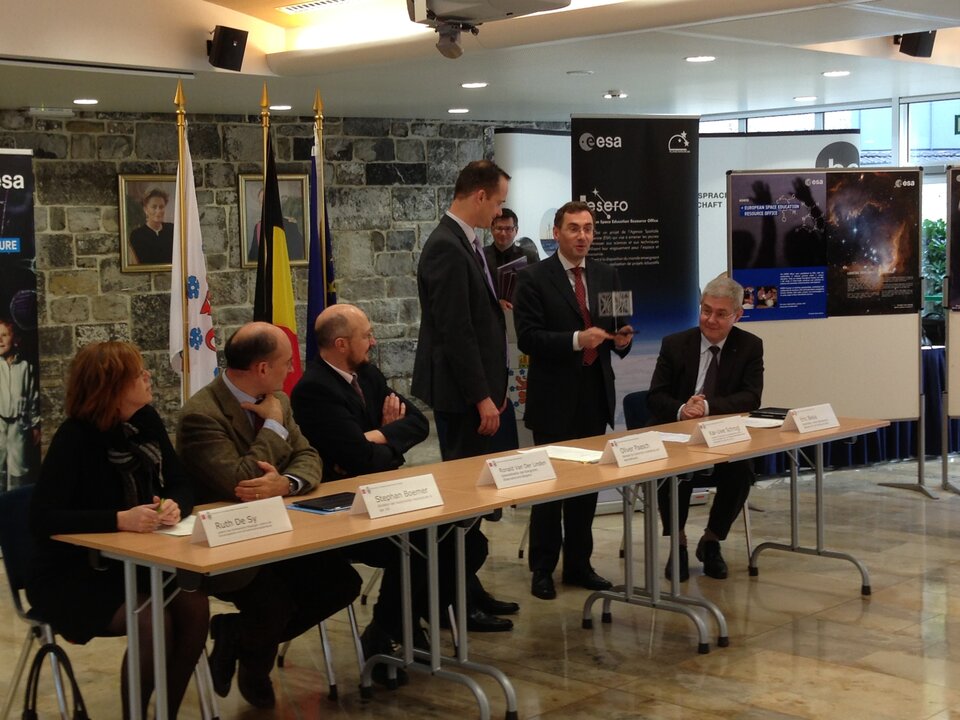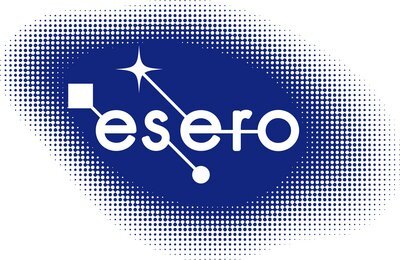Space Marries Education in the German-Speaking Schools of Belgium
A new series of initiatives aimed at bringing space themes into the classroom and eventually helping students to develop passion and competences in science and technology is launched today in the German-speaking community of Belgium.
The initiatives – including the ‘Space and Education’ and the ‘Mobile Research Laboratory’ school projects - are the result of a collaborative agreement signed today in Eupen by the Royal Observatory of Belgium on behalf of ESERO Belgium, the Belgian Ministry of Education, Training and Employment of the German-speaking Community, and the Autonomous Preschool and Primary Teacher Training College (AHS) in the German-speaking community of Belgium.
Thanks to this new agreement, the ESERO office is now bringing space-based education to the entire country, following years of successful space-related education activities in the schools of the French and Flemish-speaking communities of Belgium.
Why space-based education?

One of the highest priorities in Europe, including Belgium, is to reinforce research, innovation and education, particularly in the fields of Science, Technology, Engineering and Mathematics (STEM), in order to guarantee its future sustainability as a knowledge-based society and economy.
However, adapting to this new scheme of things presents unique challenges, such as the decreasing number of young people who decide nowadays to take up STEM-related studies and careers.
Space is multidisciplinary, encompassing a wide variety of scientific and technical expertise, from physics, to chemistry, engineering, computer sciences, environmental sciences, biology and medicine. So, from an educator’s point of view, space can be used as an incredibly fertile context to trigger the students’ natural interest and curiosity about the world around them, to better engage them in learning sciences and technology, to stimulate the acquisition of scientific methodology and to enable the development of the critical thinking they need to master their own futures.
The new projects which are part of this new agreement

The ESERO in Belgium has been active since 2006, promoting the use of space in the teaching and learning of STEM subjects in primary and secondary schools throughout the country.
According to the ESERO Belgium’s strategy and approach, the primary way to motivate students to pursue STEM studies and careers is to enter schools directly, through the main actors – the teachers – and by establishing collaborations with educational authorities enabling the teachers to deliver inspirational and innovative lessons which fit the school curricula
The ‘Space and Education’ project, which has been under way in the French-speaking community since 2007, aims to instil scientific awareness among primary-school students through experiments and classroom activities related to science - space in particular. ESERO Belgium works with teachers, principals and inspectors of a large number of schools . This project will be extended now to the German-speaking community.
Each school wishing to participate in this programme must submit a proposal to the Department of Education at the Ministry of the German-speaking Community for the experimental project they want to run in their school. The Ministry, in consultation with the ESERO Belgium, will assess if the proposed project is pedagogically adequate, and if it is given the go-ahead, the school will receive some funding to procure the necessary classroom equipment and run their project.
In addition, another project launched now in the German-speaking community of Belgium is the ‘Mobile Research Laboratory’ project. This project, also aimed at primary school students, which promotes science experimentation and investigation methods. Participating schools receive a box of experimentation materials which cover different subjects and grade levels, along with theoretical and experimental sheets. The teachers involved have to commit to be trained on experimental subjects underlying this classroom material.
Other activities which are also part of this new collaboration include the adaptation of ESERO Belgium training materials to the German-speaking community, further continuous professional development for primary and secondary teachers, and training, teacher trainers and inspectors in the school years 2013-2014, 2014-2015 and 2015-2016.
For more information
Denis Cornet
ESERO Manager for the French-speaking community
Tel: +33 1 5369 7155
Fax: +33 1 5369 7690
Denis.Cornet@planetarium.be
www.esero.be
Notes for editors
The ESERO office in Belgium is part of a larger family of offices spread throughout Europe and established by ESA in collaboration with national and institutional partners active in science education. ESERO is currently present in Belgium, the Netherlands, Norway, United Kingdom, Ireland, Sweden, Denmark, Finland, and will soon be launched in Portugal and Romania. Each ESERO office aims to support the specific educational needs of each country and their education community using a bottom-up approach.
Each ESERO promotes the use of space in the teaching and learning of STEM subjects in primary and secondary schools, supporting the specific educational needs of each country and its education community.




